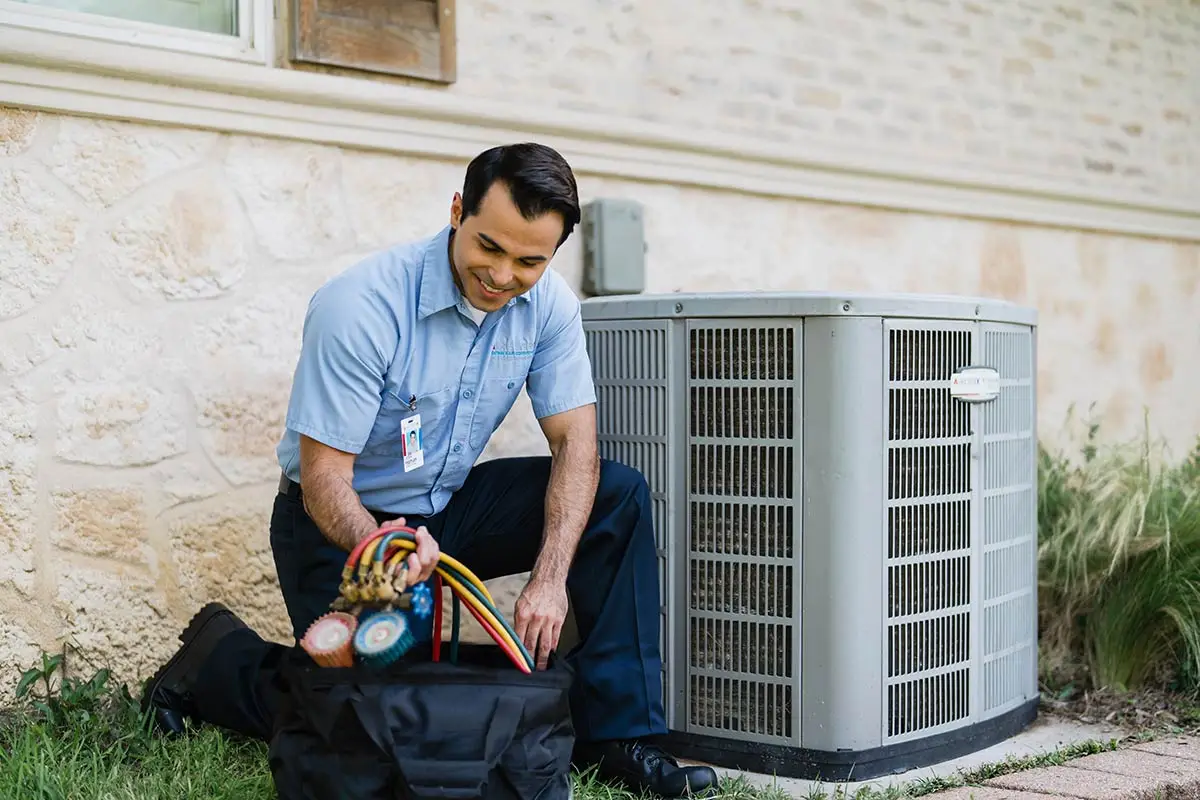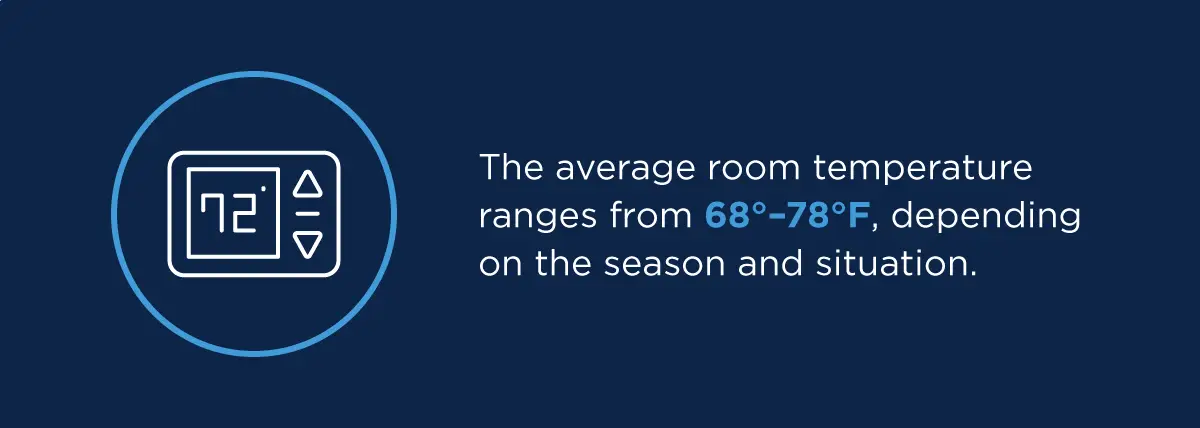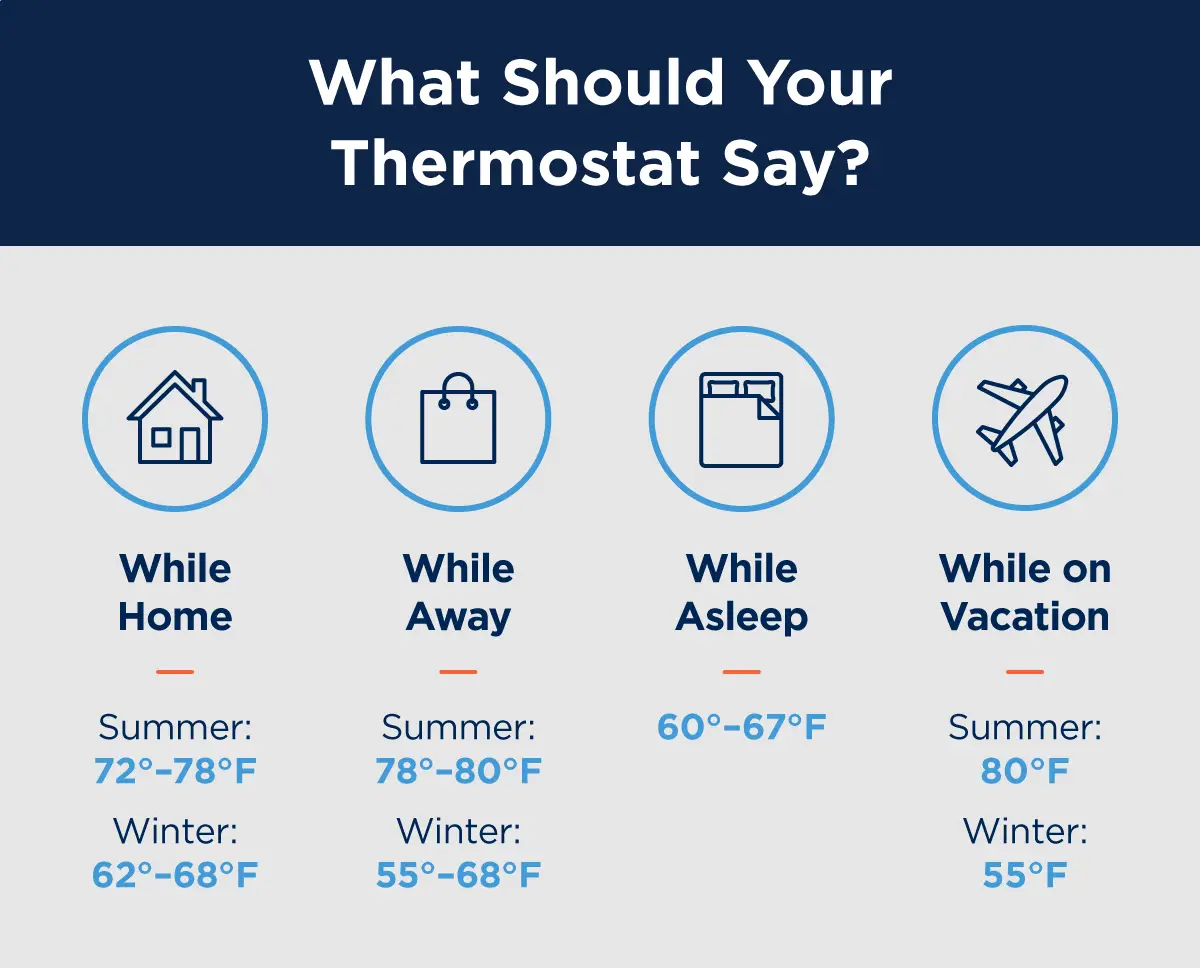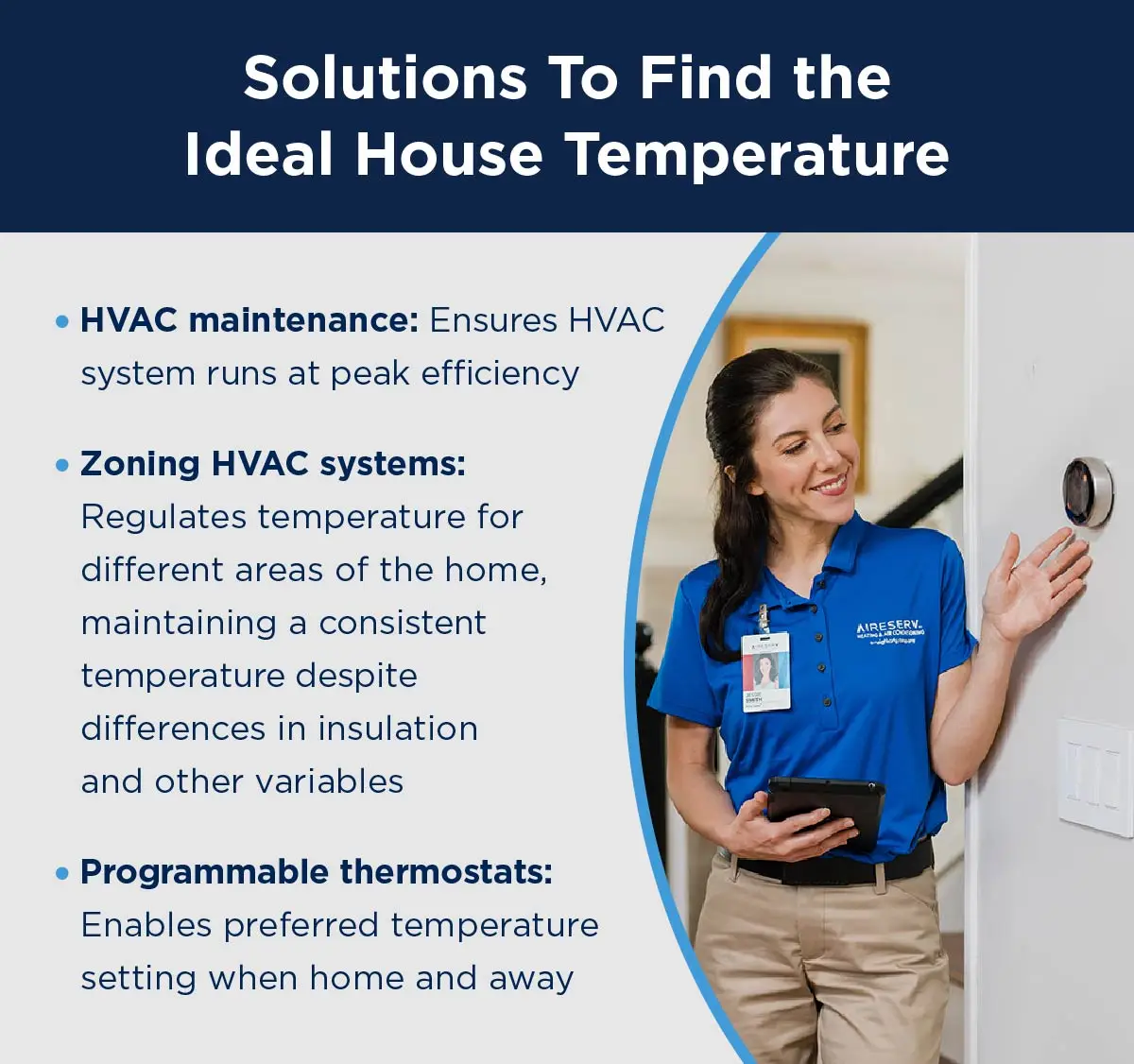Tips for Finding the Perfect Comfort Level

|
Quick answer: The ideal house temperature is room temperature, which ranges from 68 to 78 degrees F, though this may vary from season to season. In winter, the average room temperature is generally 62 to 68 degrees, whereas in the summer, the average temperature is 72 to 78 degrees. |
Everyone has their own preferences for the ideal house temperature. Some people run hot, others run cold, and some prefer to layer on thick sweaters instead of adjusting the thermostat.
While there’s not one singular temperature that’s more comfortable than others, most people tend to set their thermostats between 68 and 78 degrees Fahrenheit. That’s a fairly wide range — if you’re curious about how to find the ideal house temperature and stay comfortable all year round, contact your local Aire Serv®.
What Is Room Temperature?
Room temperature is the temperature at which most people are comfortable. This ranges from around 68 to 78 degrees Fahrenheit. However, comfort is subjective, so what feels comfortable to one person might not feel comfortable to another. Factors like humidity, airflow, and personal preferences can also affect how a person perceives room temperature.

What’s the Ideal Room Temperature for Each Peak Season?
The ideal room temperature can vary based on the outside environment and your individual preferences. In general, it’s safe to increase indoor temperature to 80 degrees in summer and decrease indoor air temperature to 55 degrees in winter when you’re not home.
Crawlable table
|
Ideal Home Temperatures |
||||
|
Summer |
Winter |
Sleep |
Vacation |
|
|
While home |
72 to 78 degrees F |
62 to 68 degrees F |
60 to 67 degrees F |
N/A |
|
While away |
78 to 80 degrees F |
55 to 68 degrees F |
N/A |
55 degrees in cold weather 80 degrees in warm weather |
Best thermostat setting for summer
The recommended thermostat setting for summer is 72 to 78 degrees. On long, hot summer days it’s tempting to push your air conditioning to the max — but be careful. Heating and cooling typically makes up the largest energy expenditures in a household.
Homeowners wishing to keep cool without busting their budget should set the summer temperature to 72 degrees when home. We recommend increasing the maximum temperature by 6 to 8 degrees (78 to 80 degrees) during summer nights or while you’re away to reduce energy consumption.
However, be careful your home doesn’t get too hot. Extreme temperatures are potentially dangerous to infants and older adults who have more difficulty regulating their body temperature. Pets can also be negatively affected by extreme temperatures. In addition, as temperatures increase, humidity often does, too. This causes things like drywall, door frames, and window frames to retain moisture and swell. If you find that windows and doors are becoming harder to open and close, lowering the temperature might be a simple fix.
Best thermostat setting for winter
The best winter thermostat setting is 62 to 68 degrees. On winter days, program your home’s thermostat to 68 degrees for a comfortable indoor temperature while you’re home and awake. When sleeping, program your thermostat to 62 degrees. Consider rolling this temperature back to 55 degrees when no one is home.
It’s important to note that if a thermostat is programmed to a set temperature and later manually set to a higher temperature, it may turn on an electric backup system and increase your energy bills.
Learn how to program your thermostat properly to ensure your house temperature adjusts for comfort and energy efficiency.
What temperature to set the thermostat when on vacation
The best temperature to set your thermostat to while you’re away is about 55 degrees in cool seasons and 80 degrees in warm seasons. This helps decrease your energy consumption when there’s no one around to enjoy the comfort of your HVAC system.
These temperature adjustments hit the sweet spot of lowering your energy bill without being so extreme that your HVAC system can’t return to ideal temperatures quickly when you return home. Be careful not to make extreme changes to your home temperature. An indoor temperature of less than 55 degrees may lead to freezing pipes, while anything more than 80 may damage drywall.
Best room temperature for sleep
While no perfect temperature applies to all humans all the time, a lot of research has been done on the ideal temperature for dozing off. Sleep psychologists recommend keeping your bedroom between 60 and 67 degrees while resting. Ideally, you want to mimic the conditions of a cave. Eliminate all sources of light and noise and adjust your thermostat down a few degrees — you’ll be sleeping like a baby in no time!
Temperature regulation is very important for staying in the deepest phases of sleep. When you’re too warm, you get pulled out of these phases to toss, turn, and adjust. Keep your house temperature cool to get a restful night's sleep. Of course, these recommendations apply to adults, so little ones may need to be kept in rooms as warm as 70 degrees for safety.

Factors That Impact House Temperature
Each home has different qualities that impact its temperature. Take these factors into consideration if you’re planning on installing a new HVAC system or determining your ideal environment:
- Home design: Factors such as high ceilings or large windows can reduce insulation in a room and increase the energy required to get to the preferred temperature.
- Room location: Central rooms in a house’s design may maintain a more consistent temperature so they’re warmer in the winter and cooler in the summer.
- Humidity: Lower humidity can make a room feel colder, and high humidity can make it feel warmer.
- Occupancy: A large group of people can make a room feel warmer. For example, you might crank the air conditioning to combat body heat while hosting a summer party.
- Pet ownership: Our furry friends can’t tell us when they’re not comfortable. Reptiles, amphibians, fish, and birds require warmer and more consistent temperatures than cats and dogs. Speak with your vet to determine the ideal temperature for your dog, cat, or any other pet.
- Age of occupants: Babies, older adults, and chronically ill individuals may not regulate their temperature as well as other people. Achieve the ideal temperature for a baby by keeping their nursery 68 to 72 degrees. The ideal temperature for older adults is similar, ranging between 68 and 74 degrees.
Tips for Maintaining Your Ideal House Temperature
Finding the right setting for your home’s thermostat can be challenging. If you have difficulty keeping your home at a comfortable temperature, there could be issues with your HVAC system. Preventative measures like regular maintenance help your HVAC system run at peak efficiency to regulate temperature without using too much energy.
It also could be time for an HVAC upgrade. A zoning HVAC system heats and cools each section of your home individually, allowing you to adjust temperatures as they fluctuate throughout your home.
Another option is installing a new programmable thermostat. These smart devices allow you to program temperature adjustments while you’re asleep or away from home. These smart devices can also learn your temperature preferences and adjust your thermostat to maximize energy efficiency and comfort.

Achieve the Ideal House Temperature
Whether you’re hoping to find the ideal home temperature, save on energy bills, or just maintain your system, Aire Serv can help. Our team of service professionals can investigate your heating and cooling concerns and help find the best solution for your situation. We provide options and advice for HVAC adjustments, repairs, or replacements when necessary.
To learn more and keep your home’s temperature just right, schedule HVAC services near you.
This article is intended for general informational purposes only and may not be applicable to every situation. You are responsible for determining the proper course of action for your home and property. Aire Serv is not responsible for any damages that occur as a result of this blog content or your actions. For the most accurate guidance, contact the Aire Serv location nearest you for a comprehensive, on-site assessment.
House Temperature FAQs
As a leader in the HVAC industry and a brand that is trusted by homeowners and businesses nationwide for our knowledge and experience, we’re happy to answer your HVAC questions. Here are answers to some of the frequently asked questions about house temperature.
What is room temperature?
Room temperature refers to the temperature range most people find comfortable for an indoor space. It ranges from 68 to 78 degrees Fahrenheit.
What is the ideal temperature for a house?
The ideal temperature for a house depends on the season. In the summer, it's around 72 to 78 degrees Fahrenheit; in the winter, it’s around 62 to 68 degrees Fahrenheit.
Is 80 degrees hot in a house?
In general, 80 degrees is too hot for a house if people are inside. However, if people aren’t home during the day or for vacation during the summer, an indoor temperature of 80 degrees can save energy until you return and lower the temperature.
Is 72 degrees a good temperature for heat in the winter?
Many find 72 degrees a bit warm for the winter — we recommend a temperature of 62 to 68 degrees. However, some people may find 72 to be a more comfortable winter temperature.
Is 65 degrees cold for a house?
During the summer, 65 degrees might use a lot of energy and be too cool for a house, but this temperature can save energy during the winter. It all depends on your personal preferences.
Is 75 degrees too hot for a house?
In general, 75 degrees isn’t too hot for a house. However, this temperature could use a lot of energy to maintain in the winter.
 Click to call
Click to call


